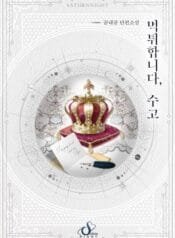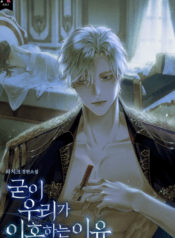Chapter 4.9
When Luette returned home, he was greeted with unexpected news.
“The Young Madam is waiting for you.”
“For me?”
“She said she’ll have dinner with you.”
As Luette was removing his coat, he glanced suspiciously toward the second floor, where the couple’s bedroom was located.
“Is she unwell?”
“No, she’s quite energetic.”
“Then is she in a bad mood?”
“No, she smiled often and spoke a lot.”
If she wasn’t sick and wasn’t in a bad mood, then why would she want to eat with him?
Luette stared at the second floor with a dubious expression for a long time before saying,
“If you go to the dining room, I’ll tell the Young Madam—”
“No, I’ll go up myself.”
With that, Luette moved. The butler looked at him with satisfaction, as if watching a groom who couldn’t bear to spend a moment without seeing his bride, but Luette was simply tired. He wasn’t hungry, either.
He just didn’t want to sit across from someone he wasn’t particularly close to and mindlessly chew his food.
Soon, he found himself in front of the couple’s bedroom and knocked lightly.
“May I come in?”
“…….”
The lack of response brought an unpleasant memory to his mind.
Without hesitation, he opened the bedroom door to find an empty room. Judging by how tidy it was, it didn’t seem like someone had been carried out sick.
As he let out a light sigh and turned to leave, he suddenly stopped and turned back to look around the room. Specifically, at the two chairs placed by the window.
Two shabby, absurdly crude wooden chairs.
On them were small bouquets of baby’s breath flowers, wrapped to fit in one hand, neatly placed side by side.
The memory of a woman rushing out in her bathrobe to grab him flashed through his mind as an afterthought.
“You’re here?”
Startled by the voice behind him, Luette turned to see Solnia standing there. Naturally, she was wearing an indoor dress, not a bathrobe.
“What are you doing here?”
Solnia glanced around the room as if questioning what he was doing in a room without its owner.
“I came because I heard you were looking for me, but you weren’t here. Where were you?”
“I was in the exhibition room.”
“Exhibition room?”
While Luette was wondering since when his house had such a thing, Lady Gwen appeared behind Solnia and gave him a mysterious, sly smile.
“Anyway, this works out well. I have something to ask you. Should we go to the dining room?”
“Unfortunately, I’m not hungry.”
“Neither am I.”
Solnia answered lightly and then instructed Lady Gwen to prepare just two cups of tea.
After Lady Gwen left, the couple was left alone in the bedroom for the first time in a while. Solnia sat on the bed, while Luette took a seat in the chair she usually used.
“What is it you want to say?”
Luette asked.
“Soon, Grandmother will host a charity bazaar.”
“Ah, that.”
Luette nodded indifferently. The Heston Dowager Madame’s charity bazaar was the event that raised the most funds in the kingdom. The Dowager Madame used the money to help the poor and hungry. The event had such a long history that there were children who had grown up, learned, and lived their lives thanks to the funds raised.
Of course, it was an event he had no interest in.
“I wanted to find something to contribute to the bazaar, but as you know, I don’t have anything of my own here.”
Once again, he nodded indifferently.
“So, I was looking for something and discovered your paintings.”
“…What did you say you found?”
“Your paintings.”
“…….”
“Surely you didn’t forget they existed?”
He had forgotten. No, he hadn’t even remembered them. It had been years since he’d been obsessed with art and sought out budding talents.
“Anyway, are you saying you want to sell those paintings?”
“Not all of them, just one or two.”
Luette scoffed. She was acting as if they were hers to sell, which he found amusing.
“Do you know how much those paintings are worth?”
“Since they’re worth so much, they’re perfect for the bazaar, aren’t they?”
She wasn’t wrong. The buyers and sellers at the charity bazaar were all nobles who had some wealth to spare.
“If you don’t care about the paintings enough to remember them, why not give me one or two?”
Solnia remained confident, and Luette suddenly felt like teasing her.
“No.”
“What?”
“I care deeply about all of them. Every single piece in that room.”
“…….”
“Why else would I dedicate an entire room to store them?”
He expected her to glare at him and call him petty, but something was off.
Solnia froze as if she’d heard something shocking. Her gray eyes stared blankly at him, particularly unfocused.
At that moment, Lady Gwen returned with the tea. When Luette silently glared at her, she seemed to quickly grasp the situation and gave a sly, knowing smile.
After Lady Gwen left, the fragrant scent of tea spread subtly through the bedroom.
Luette picked up his teacup and said,
“In any case, I have no intention of putting my cherished belongings up for sale at the bazaar.”
“Don’t lie to me.”
It was even before the moderately warm tea could flow into her mouth.
“You clearly don’t know what paintings are in that room. If you did, you wouldn’t be able to say you cherish them.”
Gone was the frozen expression; Solnia quickly regained her composure.
“I do know.”
“You don’t.”
It was a childish argument. Both of them held their teacups but didn’t drink, glaring at each other instead.
“Fine.”
In the end, Luette conceded. The fatigue he had momentarily forgotten during the ridiculous argument reared its head once more.
“Let’s put them up for the bazaar. Considering the value of items donated by the Earl and Countess of Melfir, it’s not a bad deal. But I’ll decide which pieces will be offered.”
“…….”
“And I won’t be attending the bazaar.”
Solnia nodded lightly, as if telling him to do as he pleased.
“Suit yourself.”
*
Luette visited the so-called “exhibition room” well past midnight.
He had been reading a report from Melfir about how the prolonged rain had ruined the crops and had grown tired. To clear his head, he walked down the quiet corridor in search of the exhibition room.
After opening several doors one by one, he was almost tempted to wake Gwen for directions when he finally found the room.
The room, filled with objects covered in white cloth, had an eerie atmosphere, especially at that late hour.
Setting down the lantern, Luette began examining the items and soon frowned.
It was one thing to keep early works of artists whose names he could no longer remember, but why had he kept bizarre paintings that couldn’t even be called “art”?
To make matters worse, those bizarre paintings were his own. Of course, he had painted them as a child.
As he overcame a mix of shame, humiliation, and embarrassment to select three paintings, one particularly neglected piece in the corner caught his eye.
Without thinking, Luette picked it up—and immediately doubted his own eyes.
The subject of the portrait, set against a deep green background, was none other than Solnia Heston.
His gaze, filled with disbelief, shifted to the bottom of the painting. There, as if to confirm his suspicion, was his crude childhood signature. Luette couldn’t help but tightly shut his eyes.
*
Painting was a hobby perfectly suited for passing idle time.
‘How remarkable, Young Master. You have an excellent sense of color.’
Even the tutor who came to teach him the Kingdom’s history had been impressed by his aesthetic sense, which was above average.
Such trivial praise only drew him deeper into painting.
Of course, painting wasn’t a masculine hobby like swordsmanship or hunting, which his father took pride in, so he always painted in secret, hiding in the storage room. It wasn’t difficult. The servants didn’t care what the young boy, who spent his days running around with a wooden sword, did as long as he stayed quiet.
This secret hobby flourished when he became an adult.
As soon as he graduated from the Royal School, Luette embarked on a long journey under the pretext of studying abroad and often picked up a pencil.
From ship to ship, and then another ship, painting was the best way to soothe the monotony of travel.
That day, he was en route from Epperna to Puglish. It was the second day of the voyage, and he was in a particularly severe slump.
Sitting on the deck with his hair tousled by the damp sea breeze, he struggled for a long time. The problem was that there wasn’t a model he liked.
The deep blue sea, which drew countless exclamations from onlookers, seemed dull to him. The birds soaring through the clear sky looked ordinary, and even the sailors engrossed in their work failed to capture his interest.
The issue was that everything felt too familiar.
Still, he didn’t want to use just anyone as a model. He was, after all, the “aesthetically gifted Young Master,” and that hadn’t changed.
That’s when he noticed a family. A young girl traveling with her parents. Her golden hair, braided into two plaits that gleamed under the sunlight, reminded him of another girl he once knew.






